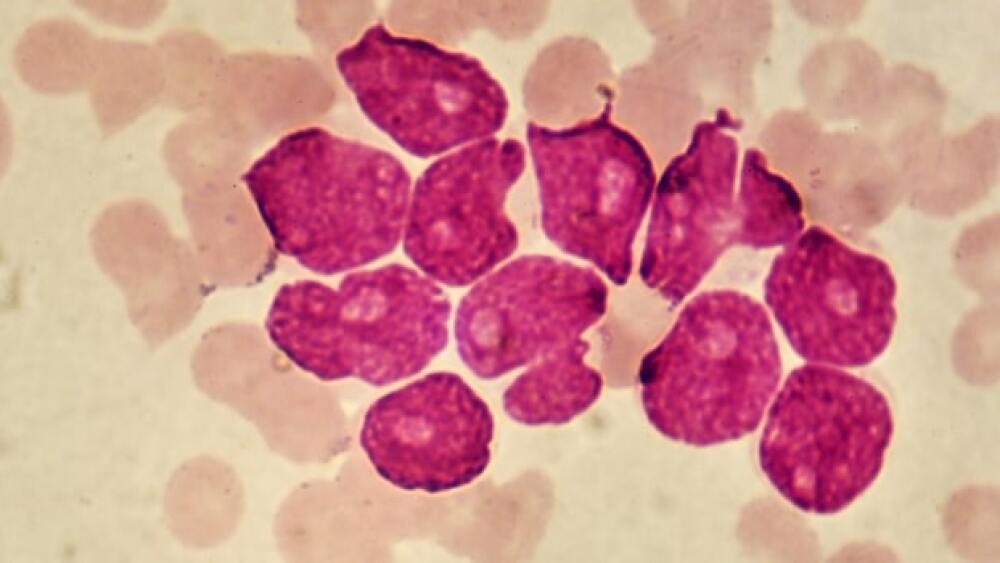Late-phase trial data show Servier’s TIBSOVO, in conjunction with chemotherapy azacitidine, prolonged event-free survival in adult patients with previously untreated IDH1-mutated acute myeloid leukemia.
TIBSOVO helping in treating untreated IDH1-mutated AML.
Late-phase trial data show Servier’s TIBSOVO (ivosidenib tablets), in conjunction with chemotherapy azacitidine, prolonged event-free survival (EFS) in adult patients with previously untreated IDH1-mutated acute myeloid leukemia (AML).
TIBSOVO is a U.S.-approved monotherapy for adults with IDH1-mutant relapsed or refractory AML as well as adult patients with newly diagnosed IDH1-mutant AML who are 75 years of age or older or those with comorbidities preventing the use of intensive induction chemotherapy. The U.S. Food and Drug Administration recently accepted a supplemental New Drug Application (sNDA) for TIBSOVO as a potential agent for previously treated IDH1-mutated cholangiocarcinoma. The FDA granted Servier’s sNDA Priority Review.
TIBSOVO was transferred from Agios Pharmaceuticals’ oncology portfolio following Servier’s acquisition of the company back in April. The acquisition totaled up to $2 billion plus royalties.
The ongoing Phase III, double-blind, placebo-controlled AGILE study compared TIBSOVO plus azacitidine with azacitidine and placebo in 148 adults with previously untreated IDH1-mutated AML. Patients in the TIBSOVO and chemotherapy combination arm had a statistically significant improvement in EFS compared with patients in the azacitidine and placebo arm.
Also, the AGILE study met its key secondary endpoints, including overall survival (OS) as well as complete remission rate (CR rate), CR and complete remission with partial hematologic recovery rate (CRh rate) and objective response rate (ORR).
According to Servier, the safety profile of the TIBSOVO combination regimen was consistent with what has been previously reported. Given the clinically important difference between the two treatment arms was identified, the study halted further enrollment based on a recommendation from the AGILE’s Independent Data Monitoring Committee.
According to Servier’s executive vice president of Research and Development, Dr. Claude Bertrand, findings from the AGILE trial “represent a major breakthrough and will be welcome news for patients dealing with previously untreated IDH1-mutated” AML.
The company’s vice president of Clinical Development, Susan Pandya, M.D., echoed Bertrand’s statements, emphasizing TIBSOVO monotherapy as being an agent that has been “instrumental” in “transforming outcomes” for indicated patients.
“These promising results from the AGILE study support the added benefit of inhibiting the mutant IDH1 enzyme in combination with standard chemotherapy in the newly diagnosed intensive chemotherapy ineligible setting,” explained Dr. Pandya. “We look forward to presenting the full results of the AGILE trial to show how TIBSOVO in combination with azacitidine may improve outcomes in previously untreated patients with IDH1-mutated acute myeloid leukemia.”
Back in June, Servier presented updated translational data at the virtual 2021 American Society of Clinical Oncology annual meeting that showed single-agent vorasidenib with TIBSOVO led to robust biomarker suppression and reduced tumor cell proliferation in patients with low-grade glioma with an IDH1 mutation.
“The updated data demonstrate that robust 2-HG suppression by vorasidenib and TIBSOVO resulted in positive changes in both the tumor cells and the tumor immune microenvironment,” said study investigator Ingo Mellinghoff, M.D., from the Memorial Sloan Kettering Cancer Center. “These findings underscore that the mutant IDH enzyme plays an active role in the growth of low-grade gliomas and that IDH inhibition may play a significant role in the future treatment of these tumors.”





